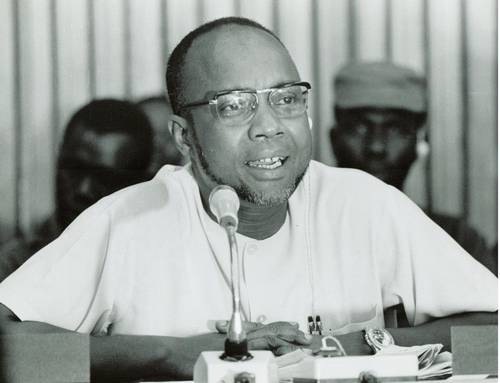Today, while taking a break from studies, I start reading some quotes. Among the quotes, I found some that belong to a Great Man, Amílcar Cabral. This guy is considered by many the father of the Cape-verdean independence, nationality and spirit. I believe he was one of the greatest man ever. Therefore I would like to share with you this small article about his life. Please don't miss the chance to get to know and learn from this great leader.
From http://www.irr.org.uk/faces/cabral.html
Amílcar Cabral
 Amilcar Cabral was born in Portuguese Guinea to Cape Verdean parents on 12 September 1924. In 1945 he gained a scholarship to study in Lisbon. His time in Portugal, from 1945 to 1952, was very important for a number of reasons. Firstly, the Second World War and its after effects had exposed the deep injustices at the heart of Portuguese society for black and white people. Secondly, whilst most colonial powers were considering dismantling their empires, Portugal wanted to tie its colonies ever closer. Thirdly, there was a great revival of African nationalism throughout the continent. These factors encouraged Cabral and like-minded relatively privileged Africans to struggle together to destroy the whole system which dominated their people.
Amilcar Cabral was born in Portuguese Guinea to Cape Verdean parents on 12 September 1924. In 1945 he gained a scholarship to study in Lisbon. His time in Portugal, from 1945 to 1952, was very important for a number of reasons. Firstly, the Second World War and its after effects had exposed the deep injustices at the heart of Portuguese society for black and white people. Secondly, whilst most colonial powers were considering dismantling their empires, Portugal wanted to tie its colonies ever closer. Thirdly, there was a great revival of African nationalism throughout the continent. These factors encouraged Cabral and like-minded relatively privileged Africans to struggle together to destroy the whole system which dominated their people.This group included a number of key figures in the wars against Portuguese colonialism, such as founding members of the Mozambique Liberation Front - FRELIMO (Eduardo Mondlane and Marcelino dos Santos) and the Popular Movement for the Liberation of Angola-MPLA (Mario de Andrade and Agostinho Neto). They organised themselves to develop their political thinking and action, as well as what Cabral called the 're-Africanization' of their minds. By working and thinking together in this way they hoped to create a common African identity which would unite the people who had been divided under Portuguese rule.
On his return to Guinea, Cabral and a handful of others set up a political party, the PAIGC. They aimed to turn the colonial system upside down by working with the people of Guinea to improve the conditions of their own lives practically. For Cabral the big ideas of national liberation, anti-colonialism and independence could only mean something if they were being worked out in the day to day lives and culture of the people. As Cabral reminded PAIGC workers, 'Always bear in mind that people are not fighting for ideas, for the things in anyone's head. They are fighting to win material benefits, to live better and in peace, to see their lives go forward, to guarantee the future for their children.' In the process of working for concrete and local improvements for themselves, the various elements of Guinean society would both liberate themselves and their country from Portuguese colonialism and their own weaknesses. The war, Cabral argued, was not against the Portuguese or white people, but the system which oppressed and exploited them all. Even so, in 1973, on the eve of Portuguese withdrawal, Cabral was assassinated and the world lost one of its clearest political thinkers and fighters.



“Always bear in mind that the people are not fighting for ideas, for the things in anyone’s head. They are fighting to win material benefits, to live better and in peace, to see their lives go forward, to guarantee the future of their children. . .” ― Amilcar Cabral
ReplyDelete